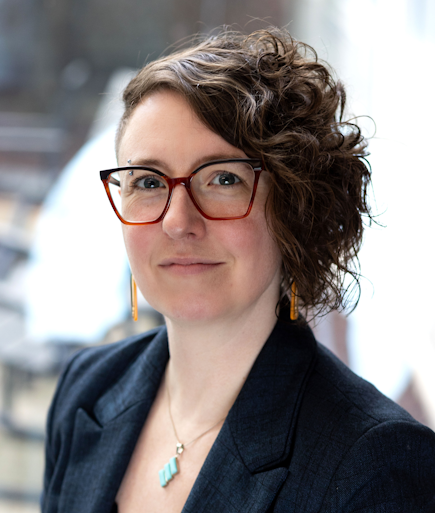A new way to die: Social Work and Anthropology doctoral student receives competitive grant to study medical aid in dying
Caitlin Cassady, a candidate in Wayne State University’s Ph.D. in Social Work and Anthropology (SWAN) program, was awarded a prestigious $10,000 grant from the Horowitz Foundation for Social Policy for her dissertation project “Medical Aid in Dying: Physician Beliefs, Practices, and Respect for Autonomy.”
The grant selection process is highly competitive, with only three percent of applicants receiving the award. Cassady emphasized that the funding is crucial for completing her dissertation. More importantly, this recognition underscores the importance of research in a frequently overlooked and underfunded area.
"We are proud that Caitlin was selected for this highly competitive grant. Her research into medical aid in dying is a testament to her unwavering commitment to improving end-of-life care,” noted Social Work Acting Dean Debra Patterson. “By delving into the complex interplay of physician beliefs, practices, and patient autonomy, she is shedding light on a critically understudied yet profoundly impactful area of healthcare."

Cassady's project brief highlights the evolving and expanding nature of medical aid in dying (MAiD) policy. The removal of residency requirements in some states seemingly makes MAiD accessible to all Americans. Her research addresses knowledge gaps, such as the balance between safeguards and access, ethical dilemmas involving disabled persons, and complexities in forming MAiD best practices.
“Aging, but especially death and dying, often feel like esoteric topics in popular culture but also the research world, which is curious since, if we live long enough, we end up doing both,” Cassady said. “This grant recognizes how important it is to study death and dying and especially new ways of dying; how physicians are responding to and constructing the practices and ideals around a relatively new way to die.”
Cassady, who comes from a family of social workers, found her way to the profession after brief stints studying acting/theater and political science during her undergrad. During her time in Wayne State’s advanced standing master of social work program Cassady completed internships in various specializations, but it was her experience caring for her grandmother with Alzheimer’s as a teen that connected her to hospice work after her graduation in 2008.
After working in hospice, home health, and trauma/intensive care, Cassady became unsettled with the systems of care and the limited choices available for dying patients and how hospice or curative/aggressive care were framed. This led her to further her education, joining Wayne State's joint Ph.D. program in Social Work and Anthropology (SWAN) full-time in 2015.
“As someone who worked in hospice and hospitals for years, present during thousands of difficult conversations about what would happen to loved ones and how long they might live, one thing that has struck me most about medical aid in dying is that it provides an important opportunity to talk about death: what people fear, what is valued or eschewed in our culture and how this matters to people who face dying,” Cassady said.
Fueling innovation is a pillar of the university’s Prosperity Agenda, launched by President Kimberly Andrews Espy in early 2024. Wayne State prioritizes and supports the discovery of new and unexpected advancements by our faculty and students, using their expertise to translate research insights and innovations into new programs and practices that change our future. Cassady hopes her research will help shift social work and other professions facing aid in dying conversations and practices to advocate for more open and accepting discussions with dying people and their families.
Social Work Doctoral Program Director Stella Resko noted “Caitlin Cassady’s research on medical aid in dying has the potential to transform our understanding and approach to death and dying. The Horowitz Foundation’s support for her interdisciplinary work underscores how our doctoral students are leading the way in addressing crucial, yet often overlooked social issues.”
About the Horowitz Foundation:
Established in 1997 by Irving Louis Horowitz and Mary Curtis Horowitz, the Horowitz Foundation for Social Policy has supported the advancement of research in the social sciences. As a not-for-profit 501 (c)(3) organization since 1998, the Foundation provides small grants to aspiring Ph.D. students at the dissertation level. Since 1999, it has made 382 awards to students worldwide.
Writer: Sarah Freeman and Editor: Betsy Vanderstelt